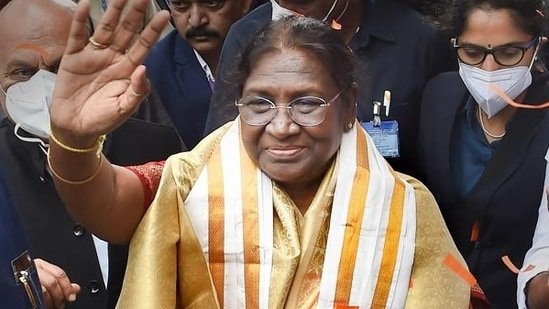Sixty- three- time-old Tapati Mandal didn’t know it also, but two simple words she heard one morning in 1964 were fated to be the morning of a miraculous story.
Mandal was in her run-down classroom at the government upper primary academy in the ethnical village of Uparbeda. The academy was a single- storey pink walled structure, the playground full of both weeds and snakes. The classroom itself had makeup shelling off the walls and rickety rustic cabinetwork to sit on. Next to her, on one similar president was her nine- time-old friend, pigtailed and eager; the Class 4 crusher, Droupadi Tudu.
The schoolteacher asked scholars to recite a lyric, and the crusher donated again. Mandal knew which lyric was coming, and why. The verses were from an Odia restatement of Robert Frost’s Stopping by Woods on a Snowy Evening. In the run up to that day, the schoolteacher had told his wards that the lyric was Jawaharlal Nehru’s fave, famously kept on his bedside table. youthful Tudu was taken by the reference. So when her friend finished the last stanza with the words, “ there are long hauls to go before I sleep ”, Mandal recalls mocking her, she asked her classmate if she planned to come a leader like India’s first Prime Minister. “ I laugh when I suppose about that day. maybe, indeed also, she was prognosticating her own future, ” Mandal says.
A nine- time-old Tudu turned to Mandal, her eyes fiery. “ Why not? ” she asked.
Why not, indeed. Fifty- five times latterly, on July 21, 64- time-old Droupadi Tudu, now Droupadi Murmu, came the 15th President of India, and the country’s first woman ethnical commander- in- chief.
The morning
put away down in a corner of Rairangpur branch of Odisha’s Mayurbhanj quarter, Uparbeda is a vill of close to,500 people, utmost of them Santhal tribals. numerous homes are still made of slush and thatch, their walls painted with the folk art depicting flowers, fruits and timbers. The terrain is lush, green and remote, dotted with sal, tamarind and teak. There’s still no irrigation, so everyone is a subsistence planter, dependent on minor timber yield for food. There’s a primary health care centre, but the lone croaker
is irregular. utmost simply ignore the dilapidated structure and go to the subdivisional sanitarium in Rairangpur city 25 km down. There’s still no piped drinking water for every home, and there’s the constant fear of wild mammoths.
Sixty times agone
, when Droupadi Murmu was growing up, the vill was indeed more remote.
The 1971 Census put the knowledge rate of Mayurbhanj quarter at12.22. There were no matriculate( a class 10 qualification) women in Uparbeda, and Murmu was determined to be among the first. Basudev Behera, who tutored her at the upper primary academy where she studied from Class 1 to 7, said “ She was good at studies, and determined at everything she did. I flash back one day it poured through the night. The coming morning, indeed preceptors skipped academy. But I watched her arrive, partial swimming and half wading through water. I told her that she had immense eventuality, and that she’d one day come a schoolteacher. ”
Indeed also, Uparbeda was too small for Murmu’s dreams. Her father, Biranchi Tudu, was the vill chief, but like everyone differently, was a borderline planter. Pushed by his son, in 1970, Biranchi Tudu took her to a public meeting held by Kartik Chandra Majhi, also the original MLA and the civic development minister in principal minister RN Singh Deo’s government. In the middle of the congregation in Rairangpur, an intolerant 12- time-old Murmu walked up to the minister, her Class 7 mark distance in her outstretched hand. Majhi, also from Uparbeda, was impressed. He told her that he’d get her admitted to a academy in Bhubaneswar.
In July 1970, Murmu packed her bags and moved to a girls ’ high academy in the state capital, 280 km down. She lived at the Kuntala Kumari Sabat hotel. In the times that followed, Murmu stayed on in Bhubaneswar, completed her training, and joined the Rama Devi women’s council in 1974 where she studied sociology and political wisdom.
Murmu was far down from her pastoral Santhali roots, girdled by musketeers from civic backgrounds, and plutocrat was hard to come by. “ Biranchi would shoot her 10 rupees a month, and she noway asked for further. She’d not indeed go to the canteen because she could n’t go it. All her energy was on completing her education, and getting a job so she could ease the burden on her father, ” said 41- time-old Saraswati Tudu, her father’s youthful family.
In 1979, Murmu got her first job as a inferior adjunct at the Odisha secretariat.
Conditional way into politics
Shortly later, she married Shyam Charan Murmu, also a bank cashier in Bhubaneswar and from the vill of Pahadpur, 10 km down from Uparbeda. In 1980, Murmu came a mama for the first time, and three times latterly quit her government job to take care of her children two sons and another son were born soon after. But she encountered a enervating particular tragedy when her firstborn son failed of an illness in 1988.
In 1993, Shyam Charan Murmu was transferred to their home block of Rairangpur, posted as an officer with Bank of India. Itching to do commodity productive, Murmu enrolled as a schoolteacher at the Arabinda Integral Education School. She was paid no payment; just gharry chow to and from home. Indira Ota, a former coworker, said, “ She had her own way of endearing herself to the scholars by telling them stories or giving chocolates to those who completed their schoolwork on time. She encouraged children to take part in adulterous conditioning and would frequently give inspirational speeches. She was veritably well- known in city. ”
Murmu’s character as a popular schoolteacher grew, and she soon began to draw attention. In 1997, one of the wards in the Rairangpur Notified Area Council, where Murmu lived with her family, came reticent for ethnical women. As parties derided for a suitable seeker, they zeroed in on her. The Congress and the recently formed Biju Janata Dal( BJD) both approached her, but prodded by a fellow ethnical schoolteacher Dibakar Mahanta and original Bharatiya Janata Party worker Nigamananda Patnaik, she inked up with the BJP.
Patnaik was also the party in- charge of the ward where Murmu lived with her hubby. “ As the ward was reserved for a ethnical woman and there were numerous bank officers that lived in that area, we allowed
we should give her the ticket. Her hubby did have some reservations about her getting into politics, but he agreed after numerous of us converted him, ” said Patnaik.
Murmu won, and came vice speaker of NAC, a post that was also reserved for ethnical women.
By this time, she and her hubby had a white Maruti 800, a vehicle that soon came ubiquitous in the narrow lanes of Rairangpur. “ She’d come in her auto and supervise sanitation work in each and every ward. This was veritably unusual in indigenous politics where utmost take a aft seat after winning an election, ” said original hotelier Debabrata Patnaik, who also canvassed for her in the choices.
BJD MLA Rajkishore Das, who began his political trip in the BJP, guided Murmu in her original times. “ She rose through the species veritably snappily because she was accessible, hardworking and that endeared her to the original BJP skeleton. Her doors were always open for original residers about communal grievances, ” said Das.
Her character kept growing, and in 2000, the BJP gave her the ticket for the Rairangpur assembly constituency despite stiff opposition from party stagers. She won, and in a rare move for a first- time MLA, was incontinently made minister for transport, fisheries and beast husbandry in the coalition government formed between the BJP and the Naveen Patnaik- led BJD. She was 42.
BJP leader and former minister Kanak Vardhan Singh Deo, who was diligence minister in the same press between 2000 and 2004, said that Murmu was given the honour despite being a relative neophyte because of her rare grassroots connect with tribals from her area. “ I had seen her work during her days in Rairangpur NAC and the party allowed
she should be promoted. Though she was a first- time MLA, she learnt the ropes snappily, was sympathetic and effective, and importantly, stayed down from difficulties. For a person that youthful, these capacities formerly meant she was well on her way to getting a successful politician, ” said KV Singh Deo.
Murmu was given the “ Nilakantha Award ” for being the stylish MLA for the time 2007 by the legislative assembly of Odisha, and between 2002 and 2009, was a member of public superintendent of ST Morcha of the BJP.
But starting 2009, Murmu began facing lapses — both political and particular. In 2009, she lost the Mayurbhanj Lok Sabha seat, finishing third behind Laxman Tudu of the BJD and Sudam Marndi of the Jharkhand Mukti Morcha, managing only18.26 of the votes cast. That same time, her 25- time-old son Laxman passed away suddenly — he was brought dead to his uncle’s hearthstone after regale with musketeers. Police suspected that Laxman had suffered head injuries after a bike collision as he was coming home.
Four times latterly, her other son, Sipun, also failed in a auto accident. In 2014, she lost her hubby Shyam Charan Murmu to a cardiac arrest. Despite the particular tragedies, she fought the Rairangpur assembly constituency the same time, but lost to the BJD’s Saiba Sushil Kumar Hansdah by over,000 votes.
For some months, Murmu sank into a well of anguish, and told her family that she was considering quitting politics. “ She came absent- inclined and stopped eating regularly. Indeed if you spoke to her, she’d not pay attention, and drift down. I tried to tell her about the futility of dwelling in the history because it was easily affecting her. I flash back telling her that we’d all die one day, and she demanded to live a life helping others without remorse, ” said her aunt Saraswati Tudu.
The ensuing time, in 2015, Murmu sounded to rebound. She joined the Prajapita Brahmakumaris, turned submissive, and began waking up at3.30 am to meditate. “ The spiritual turn brought her back from the point and she sounded calm and herself again. She began to smile again, and that sword in her eyes that we so respected returned, ” said youngish family Taranisen Tudu.
The rise and rise
latterly that time, indeed as her political career looked like it was stagnating, Murmu was given another parcel of life, and appointed governor of Jharkhand — the first woman to hold the position. Then, too, Murmu displayed a fierce sense of determination, indeed if it came at the expenditure of her own party’s government.
In 2016, the Raghubar Das- led BJP government tried to pass emendations to the Chhota Nagpur Tenancy( CNT) Act and the Santhal Pargana Tenancy( SPT) Act. The CNT Act barrednon-tribals from copping
ethnical land on the Chhota Nagpur Plateau, while the SPT Act banned land transfers in the Santhal Pargana division where CNT wasn’t applicable. The proposed emendations sought to acquire land belonging to tribals, Dalits and backward classes for structure systems. Indeed as the Opposition protested against the peremptory government, calling the laws a system to weaken the institutional protection that the two acts handed, Murmu sat on them for eight months, and ultimately returned them to the government, refusing to subscribe them into law.
“ Murmu told the government that she’d not subscribe ananti-tribal bill. She asked the government to let her know how the emendations would help adivasis. It was her way of showing that she was no pushover, ” said a elderly IAS officer in Jharkhand who worked with her.
While she discharged her duties as Jharkhand governor, Murmu noway lost sight of home.
She built a residential high school for tribal children in Pahadpur village in 2016. Named SLS (Shyam, Laxman, Sipun; after her husband and sons) Memorial Residential school, the institution is spread over three acres donated by Murmu, in which 75 students between classes 6 and 10 live and study. Janmejay Giri, headmaster of the school, said Murmu makes it a point to visit at least six times every year, on the birth and death anniversaries of her husband and two sons.
On Thursday afternoon, sounds of a celebration, at a scale yet unseen, filled the village of Uparbeda. Most residents were out on the streets singing and dancing, tribal performers beat drums, and distributed sweets.
Murmu’s childhood friend Tapati Mandal stayed inside her two-room home, her health forbidding her from joining the festivities. She offered a small prayer for Murmu in her home, and spent the morning cooking rice porridge for her family and neighbours. By noon, Mandal sat herself down in front of the small TV, and watched the visuals beamed from Parliament, hungry for every glimpse of her friend.
“When I prayed in the morning, I asked God to protect her, and that she comes home to Uparbeda soon,” she said. “I want to see her. I want to meet my friend, the President of India.”



